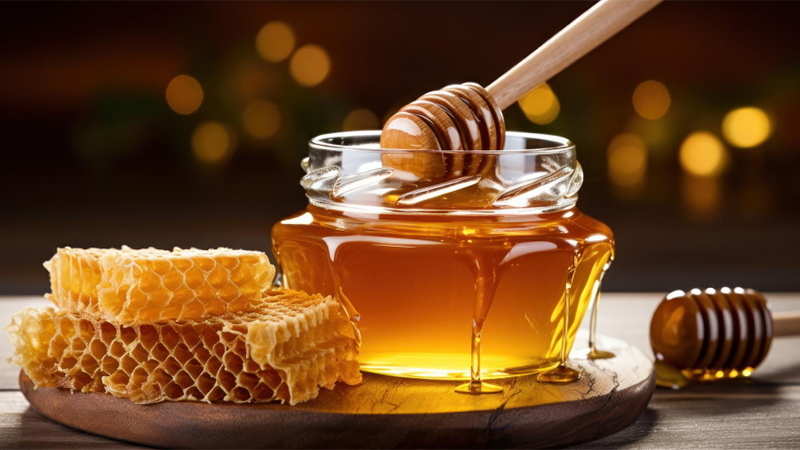Honey, often referred to as “liquid gold,” is not only a delicious natural sweetener but also a powerhouse of health benefits. This golden elixir has been used for centuries in various cultures for its medicinal properties. In this comprehensive guide, we delve into the benefits of honey, its nutritional profile, the different types available, and essential precautions to follow for safe consumption.
Benefits of Honey:
Here we listed the Benefits of Honey, Nutrition, Types, and Precautions to Follow while using honey.
1. Rich in Antioxidants:
Honey is packed with antioxidants such as phenolic acids and flavonoids. These compounds help neutralize harmful free radicals in the body, reducing oxidative stress and lowering the risk of chronic diseases like heart disease and cancer.
2. Boosts Immune System:
Honey possesses antibacterial and antiviral properties, which can help strengthen the immune system. Consuming honey, especially raw honey, can aid in fighting off infections and maintaining overall health.
3. Soothes Sore Throats and Coughs:
A well-known home remedy, honey is effective in soothing sore throats and alleviating coughs. Its natural antibacterial properties help reduce inflammation and fight bacteria, making it a popular ingredient in natural cough syrups and lozenges.
4. Enhances Digestive Health:
Honey acts as a prebiotic, promoting the growth of beneficial bacteria in the gut. This can improve digestive health, prevent bloating, and enhance nutrient absorption. Manuka honey, in particular, is known for its potent antimicrobial properties that can help treat digestive issues.
5. Natural Energy Booster:
Containing natural sugars like fructose and glucose, honey provides a quick energy boost. Unlike refined sugars, honey offers a balanced supply of energy without causing a spike in blood sugar levels, making it an excellent choice for athletes and those needing a quick pick-me-up.
Nutritional Profile of Honey:
Honey is not just about sweetness; it comes with a range of nutrients that contribute to its health benefits:
- Calories: 64 calories per tablespoon.
- Carbohydrates: 17 grams per tablespoon.
- Vitamins: Trace amounts of vitamin C, B vitamins (B2, B3, B5, B6).
- Minerals: Calcium, magnesium, manganese, potassium, phosphorus, and zinc.
- Antioxidants: Phenolic acids and flavonoids.
Types of Honey:
1. Raw Honey:
Unprocessed and unpasteurized, raw honey retains all its natural enzymes, vitamins, and antioxidants. It’s considered the healthiest type of honey due to its pure state.
2. Manuka Honey:
Sourced from the Manuka bush in New Zealand, Manuka honey is renowned for its exceptional antibacterial properties. It’s commonly used for wound healing, treating infections, and improving digestive health.
3. Clover Honey:
Popular for its mild flavor, clover honey is commonly found in supermarkets. It’s versatile and can be used in cooking, baking, and as a sweetener for beverages.
4. Acacia Honey:
Light in color and taste, acacia honey is known for its slow crystallization and high fructose content. It’s often used for its mild flavor and potential health benefits, such as aiding liver function.
5. Buckwheat Honey:
Dark and robust, buckwheat honey is rich in antioxidants. It’s less sweet than other types and is often used for its health benefits rather than its flavor.
Precautions to Follow:
While honey offers numerous health benefits, certain precautions should be taken:
1. Not for Infants:
Do not give honey to infants under one year old due to the risk of botulism, a rare but serious illness caused by bacteria that can thrive in honey.
2. Moderation is Key:
Honey is high in calories and sugars. Excessive consumption can lead to weight gain and increase the risk of developing diabetes. It’s best used in moderation as part of a balanced diet.
3. Check for Allergies:
Some individuals may be allergic to pollen or bee proteins present in honey. If you experience symptoms like itching, swelling, or difficulty breathing after consuming honey, seek medical attention immediately.
4. Quality Matters:
Opt for high-quality, raw, or minimally processed honey to ensure you receive the maximum health benefits. Processed honey often loses many of its beneficial nutrients and enzymes.
Honey is a versatile and nutritious food that offers a myriad of health benefits. From boosting the immune system to enhancing digestive health, honey can be a valuable addition to your diet. However, it’s crucial to consume it in moderation and be aware of potential allergies and risks. By choosing the right type of honey and following the necessary precautions, you can enjoy the sweet benefits of this natural wonder.





